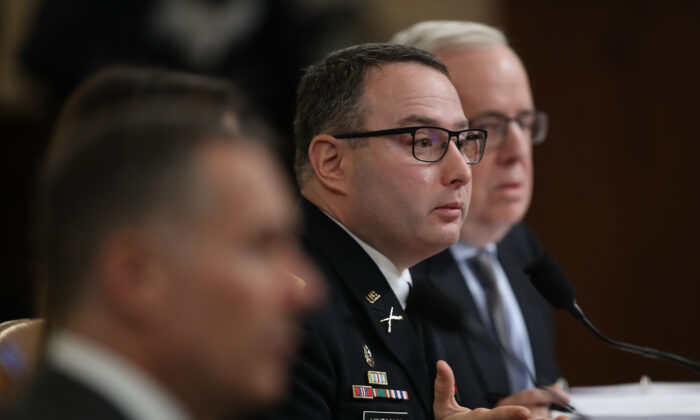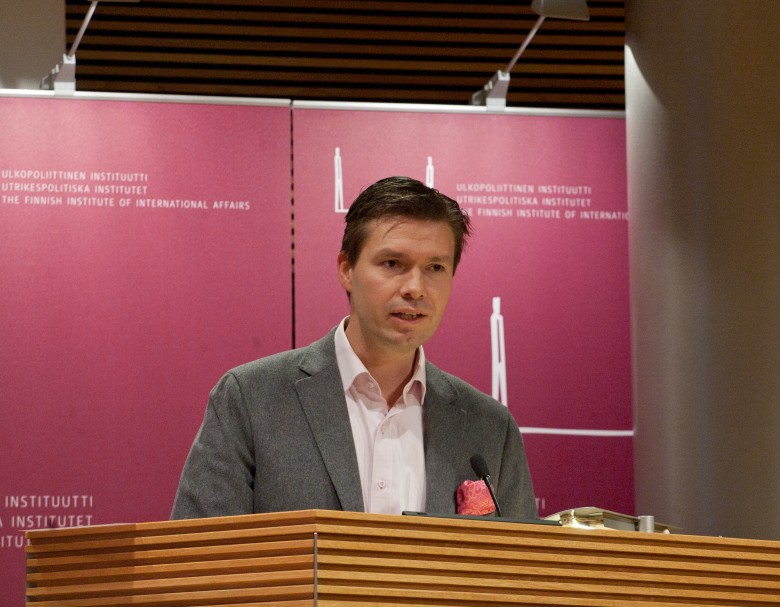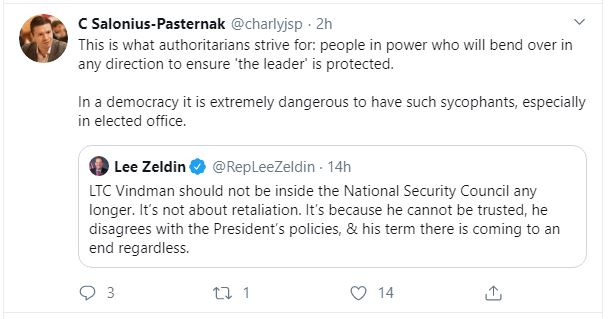Lt.Col Alexander Vindman, a national security apparatchik, worked at the pleasure of the US President. Vindman was not elected and thereby given “power by the people” in any shape or form whatsoever. These bureaucrats do not create policies of their own and delegate to others to carry them out, they present information to the president, and carry out his directives.
Finland’s US political analyst for the Finnish Institute of International Affairs | FIIA (UPI), Charley Salonius-Pasternak, is a well-known anti-Trumper. Through his tweets, it’s easy to discern that he supports the policies of the Democrat party. His hatred of President Trump has driven him to regularly burp up one nonsensical opinion after the other. He’s simply not an analyst in any sense of the word, but a partisan hack.
Concerning the firing of Vindman and his twin brother, Pasternak writes this totally disconnected from reality BS:
Like I said, these appointees do not operate from a position of power (true elected power), but at the behest of the Executive. If Vindman was in total disagreement with the president’s policies, his only legal choice would have been to resign. He could enlighten the people through the media and eventual book tour. Instead, he chose to stay on in order to disrupt and complicate the Executive’s decisions and policies.
The Finnish system is much different from the US system, Pasternak should know this, but it’s obvious that he doesn’t. As well as the fact that he obviously suffers from Trump Derangement Syndrome. If the same dynamic had been happening to Obama because of the prior Bush administration, this guy would be wailing and banging the drum as much as I am now.
Diana West has an excellent review of what has been happening inside the US government, especially during the past few years, here’s her take on Vindman: Refresher on Vindman –> The Patterns of Communist Subversion Behind Impeachment Inquiry

[…]
Perhaps Republicans came closest to exposing one of the underlying Big Lies of the impeachment inquiry when Rep. Chris Stewart (R-Utah) zeroed in on Vindman’s attitude toward alleged bona fide high crimes and misdemeanors committed by Joe Biden, according to Biden’s own, uncoerced videotaped confession.
Sounding like the mob capo Schiff channeled when the House Intelligence Committee chairman (never, ever forget) read to the American people a call transcript he had made up, Biden had bragged that as vice president, he gave Ukraine six hours to fire the prosecutor investigating corruption at Burisma, a Ukrainian oil and gas company that employed Biden’s son Hunter on its board for an estimated $80,000 per month, or else—the “or else” being the loss of $1 billion in U.S. aid. Talk about “quid pro quo.” Talk about corruption. Talk about bribery. Talk about mixing personal gain with the affairs of state.
What did Vindman have to say about that? Here is the brief exchange.
Rep. Stewart: There are dozens of corrupt nations in the world, hundreds of corrupt government officials. Exactly one time did a vice president go to a nation and demand the specific firing of one individual and give a six-hour time limit and withhold or threaten to withhold a billion dollars in aid, if not. It was the one individual who was investigating a company who was paying his son. I’ll ask you: Was that also “wrong”?
LTC Vindman: I, that is not what I understand—I, frankly, don’t have any firsthand knowledge of that.
Stewart: You haven’t seen the video?
Vindman: I’ve seen the video.
Stewart: That’s all I’ve described. Everything I just said to you was in the video. Was that “wrong” as well?
Vindman: Congressman, this is something I actually participated in and (unintelligible) …
[Oh really? That’s interesting!]
Stewart: Well, I think the American people can make a judgment.
Vindman: … that I don’t know …
Chairman Schiff: The time of the gentleman has expired. Colonel Vindman, if you would like to answer the question, you’re more than welcome to.
Vindman: I frankly don’t know any, that much more, about that particular incident. I saw the snippet of the video, but I don’t know if I could make a judgment off that.
Any child, however, could make a judgment. It’s former Vice President Biden who should be the subject of this “impeachment inquiry.”
There was one extraordinary revelation to come out of the Vindman testimony. Earlier this year, Vindman confirmed that the Ukrainian government invited him on three occasions to lead the Ukrainian armies by joining the government of Ukraine as its minister of defense.
What?
When asked why the Ukrainians might have tried to hire him away from the White House and his country to lead the Ukrainian military, Vindman said he didn’t know. The question went largely unmined for its rich and deeper possibilities. What was really going on here?
CIA whistleblower and former counterintelligence officer Kevin Shipp wrote on Twitter: “A foreign government pitches a US government intelligence official to come over and work for them? This is called an espionage pitch. What prompted Ukraine to do that? What is in Vindman’s personal life that made him a mark?”
Vindman, meanwhile, made the whole affair sound routine. Other U.S. service members, he claimed, took up positions in “the developing democracies in that part of the world, certainly in the Baltics”—a new one on me—and he even invoked an unnamed U.S. Air Force officer who, he thought, had become “minister of defense.”
Is this true? No idea. Still, why Vindman? What was it in this National Security Council official that made the Ukrainian government believe he had sufficient loyalty to its national destiny to be entrusted with its national defense, not once, but three times?
When Vindman concluded his remarks by saying it was actually “kind of comical” for a lieutenant colonel in the U.S. Army to be offered “that illustrious a position,” a shaft of sunlight appeared. Were these Ukrainian offers even designed to win Vindman’s acceptance?
Researcher Jeff Nyquist saw through to another possible layer of motivation, writing on Twitter: “I think it was was an ‘atta boy’ from the Soviet Ukrainians.”
Atta boy? Soviet Ukrainians? Such notions will short-circuit the linkage between disinformation and conventional wisdom, a linkage that deceptively or naively asserts that to be “Ukrainian” is to be safe from all Moscow subversion and infiltration, to be air-tight and walled-off from Moscow’s sophisticated, relentless, time- and battle-tested programs of Active Measures. (Active Measures is KGB-speak used, to quote a 1982 interagency definition, “to refer to active operations intended to provoke a policy effect, as distinct from espionage and counterintelligence. … Specifically, they are intended to influence the policies of foreign governments … undermine confidence in foreign leaders and institutions, and discredit opponents. …”)
To disregard the history of Active Measures in Ukraine or anywhere else (of course, including in the United States) isn’t only absurd but reckless. However, such disregard is the basis of consensus across the political and media spectrum.
It’s widely believed that there separately exist purely Russian vectors of influence and purely Ukrainian vectors of influence—that never the twain shall meet or be mixed; that never the long history of Soviet/Russian subversion of Ukraine and every other nation Moscow seeks to influence shall come under even theoretical consideration in trying to understand the facts of the anti-Trump, anti-America conspiracy, let along force them into the light.
As an aside, consider a graph in a 2015 Wall Street Journal article showing that out of all the nationalities in the world, “Ukrainians” topped the list of foreign donors to the Clinton Foundation (1999–2014). “Russians” don’t even make the top 15. Really?
By week’s end, a new phase of Trump–Russia was taking shape, shepherded by the testimony of the curious Fiona Hill (to be discussed in the next installment): We are now supposed to take sides on whether it was this separate state called Russia or this separate state called Ukraine that tried to influence the U.S. election.
Again, consider Nyquist’s notion of “Soviet Ukrainians” offering the defense ministry as a blandishment to the plump White House lieutenant colonel who has been so very cooperative and empathetic to “Ukrainian” interests. …
Consider also that if there are “Soviet Ukrainians,” there are “Soviet Americans,” too.


